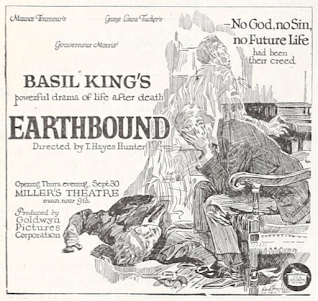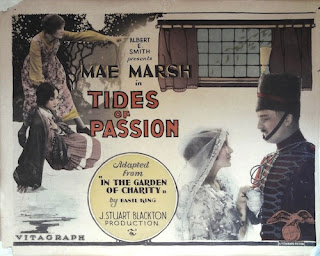A brief addendum to last week's post on Basil King's 1912 novel The Street Called Straight.
Seven Basil King novels have made it to the silver screen thus far, the earliest being a 1915 adaptation of The Wild Olive (1910). The most recent, Tides of Passion, is based on King's 1903 novel In the Garden of Charity.
One hundred years have passed since Tides of Passion – last month marked the centenary of its release – and yet I hold out hope that further adaptations are on the way.
The film called The Street Called Straight was the first of two Basil King features produced by Eminent Authors Pictures Inc. EAP, as I'm sure it was never known, was the short-lived brainchild of Samuel Goldwyn and Rex Beach. Their idea was to focus less on big stars and more on the writers who'd penned the novels upon which the films were based. Other Eminent Authors included Gertrude Atherton, Mary Roberts Rinehart, Rupert Hughes, Gouverneur Morris, and Charles E. Whittaker. and of course, Beach himself.
 |
| Moving Picture World, 21 February 1920 |
The man tasked with reducing The Street Called Straight, a 415-page novel to 4986 feet of film, was Edward T. Lowe, Jr, (1890-1973). He's best known, I suppose, for House of Frankenstein (1944) and House of Dracula (1945). This is not to suggest that King played no part in bringing The Street Called Straight to the screen. If trade magazine accounts are to be believed, the author was an active participant and was often present on set.
King was so keen on the new medium that he came up with ideas for future films. Earthbound (1920), his second Eminent Authors picture, was based on an original story that reflects his growing interest in spiritualism. Sadly, it is another lost silent. One-hundred-and-five-year-old reviews suggest that it ranks with The Miracle Man, Hollywood's adaptation of fellow Canadian Frank L. Packard's novel of the same name, as one of the great lost silent films.
 |
| Moving Picture World, 11 December 1920 |
The Street Called Straight is also a lost film. In fact, every screen adaptation of a King novel – In the Garden of Charity, Let No Man Put Asunder, The Inner Shrine, The Wild Olive, The Street Called Straight, The Lifted Veil, The Dust Flower – is lost. And so, given that it is likely no one alive has actually seen The Street Called Straight, we rely on contemporary reviews to give some sense of what we're missing.
What surprises most is that every review describes a film that in no way deviates from the source material. Hell, Fight Club deviates from the novel. Do not get me started on 1998's The Patriot.
Screenwriter Lowe's adherence to the plot is unlike anything I've seen in a silent film. The longest description I've found, published in the 21 February 1920 edition of Moving Picture World, could serve as a summary of the novel itself:
Did that serve as a spoiler? You knew Olivia and Peter would end up together in the end, right?












No comments:
Post a Comment